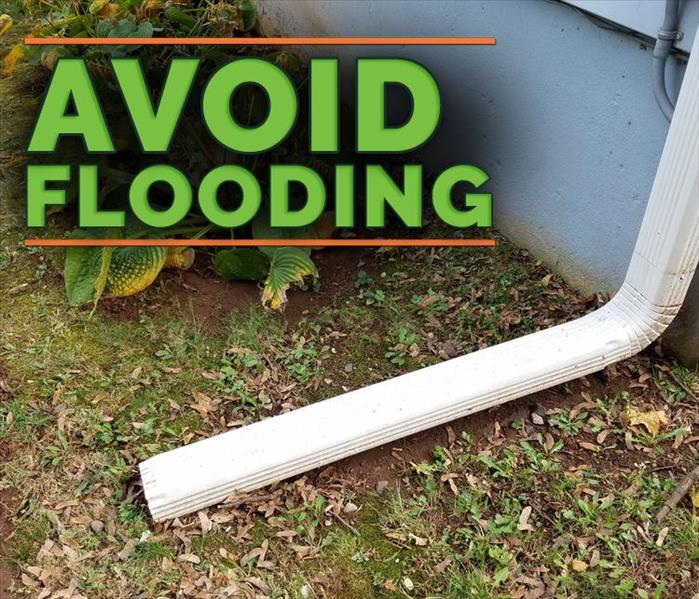What Can Cause a Flooded Basement?
11/2/2022 (Permalink)
 Make sure downspouts are extended to at least three feet away from your house to avoid flooding in a basement
Make sure downspouts are extended to at least three feet away from your house to avoid flooding in a basement
What Could Flood a Basement?
When a home floods, it can be devastating. And while some homes flood after days of heavy rains or snow, some homeowners may experience flooding from a simple faucet drip or a faulty sump pump. The good news is that there are ways to prevent basement flooding in your home. But what can cause a flooded basement?
Heavy Rainfall
Probably one of the most obvious causes of a flooded basement is heavy rainfall. Rainfall can cause basement flooding, but you can take some steps to prevent that. If you live in an area prone to heavy rainfall, keep your gutters and downspouts clean and make sure they don't overflow when it rains. Make sure all of the windows on your home are secure so water doesn't leak through them into your basement or crawlspace. You should also replace any damaged gutters or downspouts as soon as possible to avoid further damage from rainwater seeping through cracks in the structure of your house.
If heavy rainfall does cause flooding in your basement, call a professional right away for help with cleanup and repair services.
Melting Snow and Ice
Melting snow and ice is also a common cause of flooding. When the snow melts, it can cause water to flow into your basement. If this is the case, you will want to call an expert for help in removing the excess water as soon as possible so that it doesn't damage your home any further.
Faulty Downspouts
Faulty downspouts are another common reason for basement flooding. Downspouts are designed to divert water away from the foundation of your home, but if they're broken or not connected to the storm sewer or drain system, they can cause water to back up into your basement.
To make sure that this isn't happening at your house, inspect all of your downspouts and make sure that they're clear of debris and working properly.
Faulty Sump pumps
Sump pumps are designed to remove water from a basement. They are often located in the basement and controlled by a switch. Sump pumps can fail if they get clogged, or if the float switch sensor fails. If this happens, water will continue to enter your basement until it reaches a certain level, at which point it will flow over into your home.
It’s also possible for an older sump pump system to have been upgraded without checking its compatibility with newer wiring and other electrical components installed in your home’s foundation walls during construction or remodeling projects.
Sewage or Drain Backups
Sewage or drain backups are also a serious problem that can easily cause a basement flood. Sewage can contain harmful bacteria and viruses that can cause serious illness. Some of the most common pollutants found in sewage include:
- Bacteria
- Viruses
- Parasites
Your House’s Location
Your house’s location can play a role in the likelihood of flooding. If you live in an area that is prone to flooding, it is more likely that your basement will flood if there are severe storms or other weather conditions occur. For example, if your home is located near a river or lake, then it may be susceptible to flooding during heavy rains. The same goes for homes on hillsides; these types of homes are vulnerable to erosion and landslides that could lead to water entering the home.
Broken Sewer Lines and Clogged Drains
A broken sewer line or a clogged drain can be a major problem that causes water to leak into your basement. A broken sewer line is more of an emergency situation, as it can cause raw sewage to leak into your home and potentially contaminate all the contents inside. This is especially true if the break is large enough for wastewater to flow from one side of the break to another side (for example, through your basement wall).
Causes for Flooding
It's important to note that there are a variety of causes for flooding, all of which can lead to mold problems and structural damage if not corrected quickly and properly.
If you suspect that there may be any amount of water damage in your home after a flood event, make sure to get an inspection from our team at SERVPRO. We'll carefully go through every inch of your property before giving you our assessment of what needs attention so we can pinpoint where any potential problems lie so they don't become bigger ones later on down the road when they aren't addressed right away.
If you’re experiencing flooding in your basement, it can be a stressful situation. However, there are many reasons for basement flooding that can be easily fixed. If you notice water collecting around the foundation of your house, contact a professional immediately to determine the cause and remedy it before further damage is done.



 24/7 Emergency Service
24/7 Emergency Service